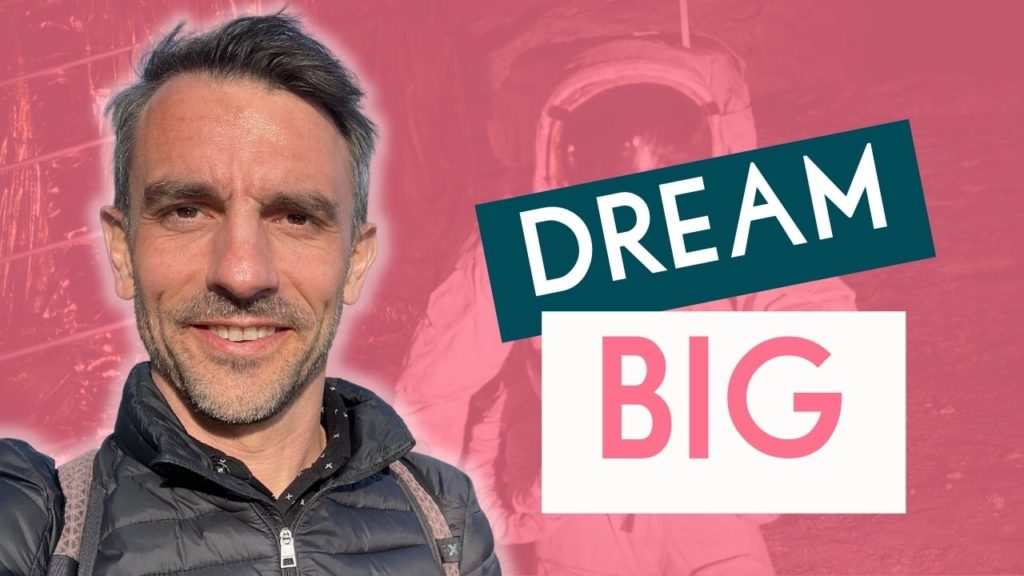
Success doesn’t happen by accident. To maximize your potential, you have to have a clear goal and plan to get there.
And that’s where most people go wrong. They don’t dream big enough. They play it safe. They don’t have a vision for their lives that is ten times better than what they currently have.
But that’s precisely what you need to achieve anything significant.
Let’s talk about the power of dreaming big and why it’s so essential if you want to achieve success in life.
The self-help book, The 10X Rule by Grant Cardone, is based on the idea that most people’s biggest mistake is not setting goals high enough.
Playing it safe may be easier, but it will set you up for a lesser life. In the words of Cardone, “Most people don’t like having big goals, because they don’t like setting themselves up for failure and disappointment.”
In fact, the opposite is true: You need to have a big vision to achieve big things.
And surprisingly, a big vision is often easier to achieve than a lesser vision because it engages you more intellectually and emotionally.
When President Kennedy visited the Cape Canaveral Space Center, he met a man in overalls sweeping the floor. The President asked him, “What do you do for NASA?”
“I’m helping put a man on the moon,” the janitor replied.
Planning a moonshot was a vision big enough to fire up that worker and the entire country.
In the same way, when I prepared for my first marathon, I didn’t take it lightly. I put all my energy into training, gradually increasing the distance I ran each day until I felt ready to complete the entire 26.2 miles / 42.2 km. If, instead, I had been preparing for a 10 km race, I probably would have kept training as usual and winged it since the shorter race wouldn’t have excited me as much.
People erroneously believe that too high expectations lead to unhappiness and stress. Cardone disagrees. “It’s not unmet expectations that create unhappiness. Rather it’s not living your life to a high level, it’s not actually taking extreme action and watching yourself succeed.”
The Americans chose a colossal vision. Going to the moon before the end of the decade seemed unlikely, if not impossible. And yet, I argue that Neil Armstrong and his colleagues managed to get to the moon because of that audacious vision.
God wants you to have big visions and to glorify Him with your efforts. And He promises to help you, too. To quote Paul: “Now to him who is able to do far more abundantly than all that we ask or think, according to the power at work within us, to him be glory.”
With God, you can do far more than you are able to imagine doing on your own.
To open yourself up to God’s big vision for you, I encourage you to recite this prayer by Sir Francis Drake, a sea captain, naval officer, and explorer: “Disturb me, Lord, when I’m too well pleased with myself, when my dreams have come true. Because I have dreamed too little, when I arrived safely. Because I sailed too close to the shore.” As a kite surfer, I know it’s safer near the shore. But the real action—the exciting stuff—takes place out at sea.
When following God’s vision for you, you must do it for His glory, not your personal satisfaction. As Paul reminded the Colossians, “Whatever you do, work heartily, as for the Lord and not for men, knowing that from the Lord you will receive the inheritance as your reward. You are serving the Lord Christ.” And with Him, all things are possible.
Peter thought he was done. When Jesus got arrested the night the Passover celebration began, the brave fisherman denied that he was one of Jesus’s disciples three times. Peter decided to go back to his trade. But Jesus had a much bigger vision. “Feed my sheep,” the Messiah told him.
Little did Peter know that it would become a reality soon. On Pentecost, divided tongues as of fire appeared to the followers of Jesus. And as they began to speak in other languages in Jerusalem, the people were amazed and perplexed. “They are drunk!” Others said.
That’s when Peter’s “feed my sheep” moment came. “Peter stepped forward […] and shouted to the crowd, “Listen carefully […] these people are not drunk […] what you see was predicted long ago by the prophet Joel.” He preached the good news, saying, “So let everyone in Israel know for certain that God has made this Jesus, whom you crucified, to be both Lord and Messiah!”
Filled with the Holy Spirit, Peter became bold and said, “Yes!” to God’s calling. And God did far more abundantly than all that the former fisherman thought. Luke wrote, “Peter’s words pierced their hearts, and they said to him and the other apostles, “Brothers, what should we do?”
About 3,000 people believed what Peter had said. After being baptized, they joined the church.
When you accept God’s help, however, you must relinquish some of your control to Him, and that’s when it gets scary. No one wants to feel out of control.
Just remind yourself how much more you can accomplish with Him. Think about the Bible story of the five bread loaves and two fish that Jesus multiplied to feed a crowd of 5,000 men, plus all the women and children who accompanied them.
I keep my visions small because I want to stay in complete control. But by doing so, I probably have missed out on jaw-dropping miracles. I now realize I must relinquish my limited and often selfish vision and accept Jesus’s extraordinary vision.
You may spend 40, 50, or more hours a week at work pursuing your vision. To live a spectacular life, your vision must thrill you. So, ask yourself, “Am I passionate about what I do?”
For many years, I played music in the music ministry at my local church. We even had the opportunity to write and record new songs. I felt blessed and enjoyed the time I spent practicing with the other members. And then, for some reason, my excitement began to wane. I continued to play with the group, but it became something I had to do to serve my church.
Over time, I realized that by doing something I was no longer passionate about, I was not living up to my full potential, so I left the music ministry.
A short time later, I began coaching other group leaders. That role appealed to me more because I could help other leaders who then, in turn, would use this knowledge to teach their groups. I felt I was paying it forward — an essential part of my vision for myself.
The apostle Paul had an exciting vision. “Him we preach, warning every man and teaching every man in all wisdom, that we may present every man perfect in Christ Jesus.” He wanted everyone to hear God’s great gift to us in Jesus Christ.
“He started with virtually nothing except faith and passion,” wrote the Associate Professor of New Testament at Queen’s Theological College, Richard Ascough, and the former chair of Programs for Management at Queen’s University in their book Passionate Visionary. “Yet he built and sustained a fragile network across the known world, one where he coached, cajoled, and inspired hesitant followers.”
Passion kept Paul going; despite hardships, disappointments, exhaustion, and countless setbacks. “Almost two thousand years later, the heritage of the communities he founded continues in the faith communities of the Christian tradition,” they concluded. Passion fueled his seemingly impossible vision.
Visions change. And we change, too. So, ask yourself, “Am I passionate about my vision? Would I get up in the middle of the night to work on it?” Big visions require hard work. And they ask for enormous sacrifices. You need the added power of passion for your vision to make it to the moon.
